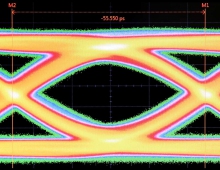
Rambus Loses Patent Case At ITC
Chipmakers LSI and Mediatek and chip design house STMicroelectronics NV did not violate Rambus's patented chip technology, a judge at the International Trade Commission said on Friday.
Rambus had accused a many companies of infringing six patents for, among other things, memory controllers and high-speed chip-to-chip communication systems.
The Administrative Law Judge (ALJ) for its U.S. International Trade Commission (ITC) action against LSI Logic, MediaTek, ST Microelectronics and other Respondents has issued an Initial Determination.
ALJ Theodore R. Essex found there to be no violation of Section 337 of the Tariff Act of 1930 for the patents in question.
Rambus said it might request a full Commission review of the ALJ's Initial Determination. If the Commission grants a petition for review, it may affirm, modify, reverse, set aside, or remand all or part of the ALJ's decision in developing the ITC's final determination.
"We have yet to receive the decision, but are disappointed with the initial determination of no violation," said Thomas Lavelle, senior vice president and general counsel at Rambus. "We believe in the strength of our portfolio and remain committed to protecting our patented inventions from unlicensed use."
In an earlier investigation, 337-TA-661, this same ALJ found that three Rambus patents also asserted in this investigation were valid, enforceable, and infringed by NVIDIA. That determination was affirmed by the full Commission before NVIDIA and Rambus signed a patent license agreement.
On December 1, 2010, Rambus filed a complaint with the ITC requesting an investigation pertaining to certain products. The complaint sought an exclusion order barring the importation, sale for importation, and sale after importation of products that infringe a number of Rambus patents from the Dally and Barth families. For the Dally patents, the accused semiconductor products from the aforementioned companies include ones that incorporate PCI Express, certain Serial ATA, certain Serial Attached SCSI (SAS), and DisplayPort interfaces. In the case of the Barth patents, the accused semiconductor products include ones that incorporate DDR, DDR2, DDR3, mobile DDR, LPDDR, LPDDR2, and GDDR3 memory controllers. Accused semiconductor products in the complaint include graphics processors, media processors, communications processors, chip sets and other logic integrated circuits (ICs). Since the investigation was instituted, Rambus has signed patent license agreements with former Respondents Broadcom, Freescale, and NVIDIA.
The full commission is expected to make a ruling in July.
The case at the International Trade Commission is Number 337-TA-753.
The Administrative Law Judge (ALJ) for its U.S. International Trade Commission (ITC) action against LSI Logic, MediaTek, ST Microelectronics and other Respondents has issued an Initial Determination.
ALJ Theodore R. Essex found there to be no violation of Section 337 of the Tariff Act of 1930 for the patents in question.
Rambus said it might request a full Commission review of the ALJ's Initial Determination. If the Commission grants a petition for review, it may affirm, modify, reverse, set aside, or remand all or part of the ALJ's decision in developing the ITC's final determination.
"We have yet to receive the decision, but are disappointed with the initial determination of no violation," said Thomas Lavelle, senior vice president and general counsel at Rambus. "We believe in the strength of our portfolio and remain committed to protecting our patented inventions from unlicensed use."
In an earlier investigation, 337-TA-661, this same ALJ found that three Rambus patents also asserted in this investigation were valid, enforceable, and infringed by NVIDIA. That determination was affirmed by the full Commission before NVIDIA and Rambus signed a patent license agreement.
On December 1, 2010, Rambus filed a complaint with the ITC requesting an investigation pertaining to certain products. The complaint sought an exclusion order barring the importation, sale for importation, and sale after importation of products that infringe a number of Rambus patents from the Dally and Barth families. For the Dally patents, the accused semiconductor products from the aforementioned companies include ones that incorporate PCI Express, certain Serial ATA, certain Serial Attached SCSI (SAS), and DisplayPort interfaces. In the case of the Barth patents, the accused semiconductor products include ones that incorporate DDR, DDR2, DDR3, mobile DDR, LPDDR, LPDDR2, and GDDR3 memory controllers. Accused semiconductor products in the complaint include graphics processors, media processors, communications processors, chip sets and other logic integrated circuits (ICs). Since the investigation was instituted, Rambus has signed patent license agreements with former Respondents Broadcom, Freescale, and NVIDIA.
The full commission is expected to make a ruling in July.
The case at the International Trade Commission is Number 337-TA-753.




















